When a prospect hits you with the dreaded objection, “I’ll get back to you…” what do you do next?
What exactly do you say to get around this common pushback?
How do you keep the conversation moving forward?
Let’s face it—it’s never a good feeling when a prospect says, “I’ll get back to you.” But that doesn’t mean it has to be the end of the sale.
In this video, I’m going to show you exactly what to say when a prospect says, “I’ll get back to you,” so you can maneuver around this common objection and keep the sale on track. Check it out:

Prospect Says, “I’ll Get Back to You” Tip #1: This is never acceptable.
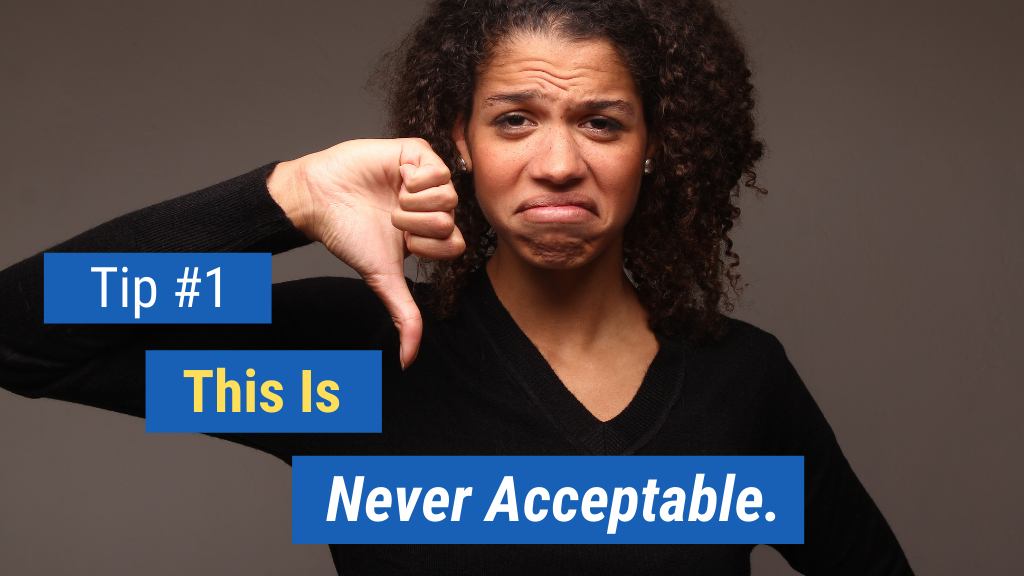
The first commitment you have to make is that “I’ll get back to you” is a completely unacceptable outcome in any sales situation.
If your sales conversations consistently turn to the prospect saying they’re going to get back to you back later, you’ll inevitably find yourself sitting around for calls that will never come—and you’re never going to make sales.
Prospects never get back to you. Most of the time, when a prospect says, “I’ll get back to you,” it’s simply a way for them to get out of the selling situation without being confrontational.
Always remember that “I’ll get back to you” is never acceptable. At the very least, you must switch the dynamic so that you’re the one reaching back out to the prospect.
It’s never okay for the prospect to be the one with the responsibility of reaching back out to you.
Tip #2: Understand what it means.
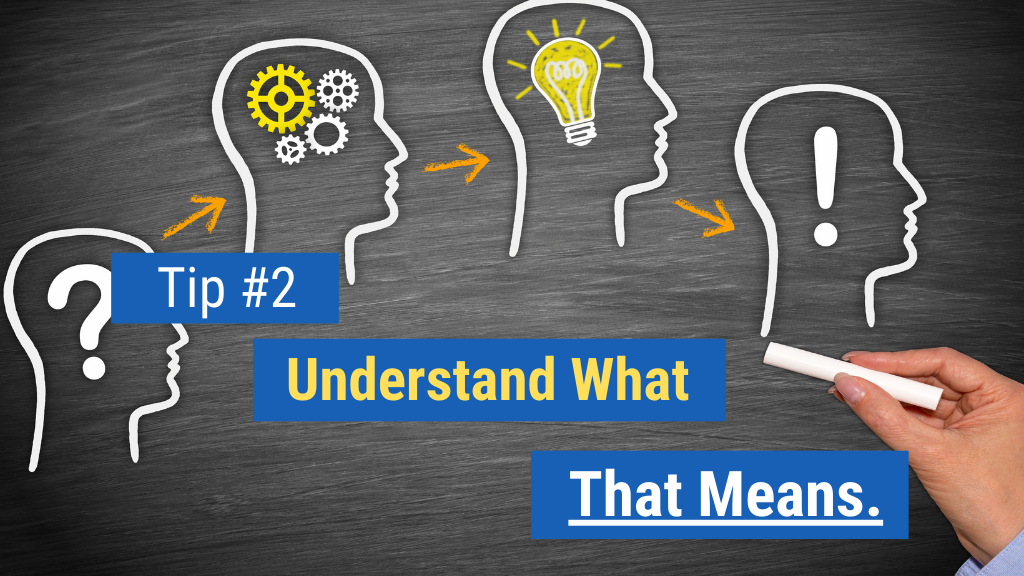
So, what does it really mean when a prospect says, “I’ll get back to you”? I’ve already alluded to this, but it essentially means you’re losing the sale.
In fact, the likelihood of a prospect getting back in touch with you is about 1 in 100. (Really—we have the data on this.) This means you’ve effectively lost any sales in which a prospect gives you this objection, assuming you just acquiesce and end the conversation.
Because of this, you’re far better off dealing with the objection in the moment, rather than kicking the can down the road and saying, “Okay, sure, get back in touch whenever is good for you.” This is super weak—plus, you literally have nothing to lose, given the terrible odds of the prospect actually getting back to you.
Recognize that when you hear a prospect say, “I’ll get back to you,” you’re losing the sale, for all intents and purposes.
Understanding this is key to giving you the motivation and strength to push back, and do whatever you can to firmly set the conversation on a different, more productive path.
“I’ll Get Back to You” Tip #3: Understand why they said that.
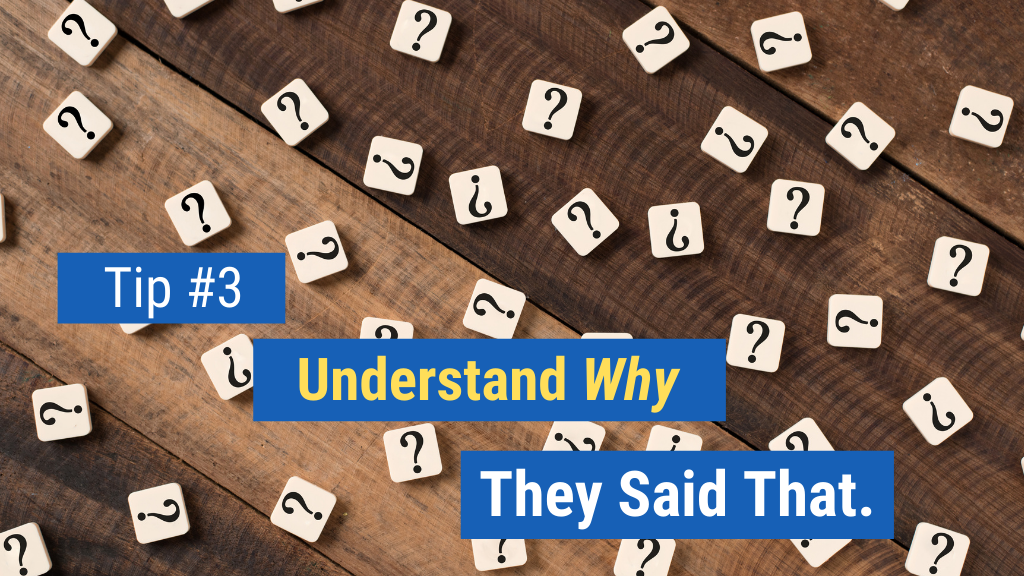
This is where you start to get into some verbal jujitsu. When the prospect says, “I’ll get back to you,” instead of responding with a statement of your own, it’s important that you respond with a question.
Say something such as, “All right. I appreciate your saying that. Help me understand why you say that?” The goal is to get them to at least clarify why they’re saying that they want to get back to you.
The prospect might say, “Oh, well, the timing on this just isn’t right. So, how about I just reach back out to you when the timing is better?” And now that you’ve got some clarification, you understand where you stand, and you can push back in a more strategic way.
Prospect Says, “I’ll Get Back to You” Tip #4: Always get a next meeting.
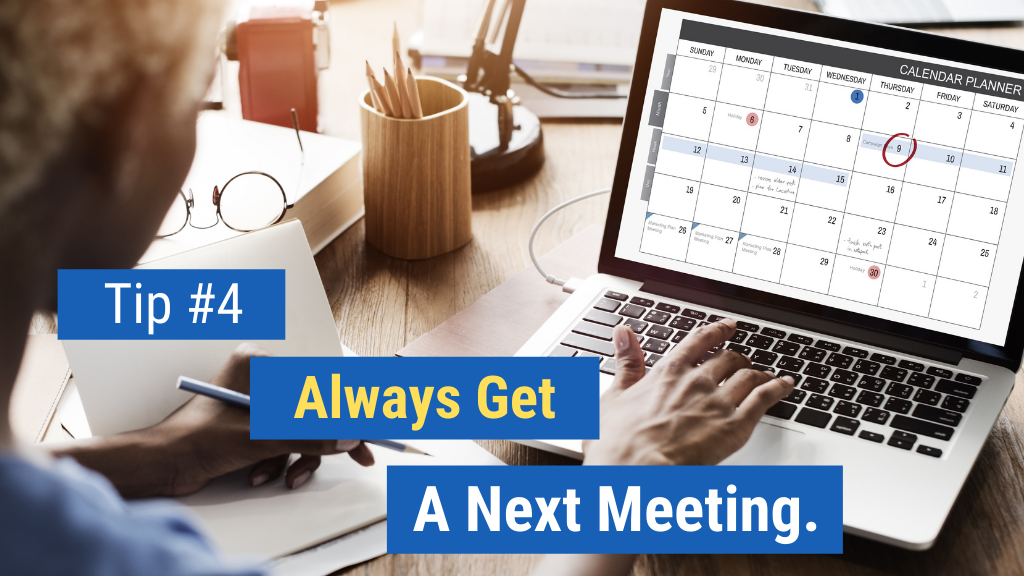
The absolute best way to push back when a prospect says, “I’ll get back to you,” is to actually schedule a next meeting. You always want to focus on getting a next meeting in place—that should be your primary goal when you hear this objection.
You might say something to the prospect like, “I really appreciate your saying that the timing isn’t right and you want to get back to me later. But just to avoid all the back and forth, would it make sense to at least just get something in the calendar, so that way we can avoid the ‘you-try-me, I-try-you’ stuff? Would you be available sometime next week?”
And now, you’ve set the stage to get an actual meeting in the calendar. I can’t emphasize enough how important this is. Always get a next meeting.
“I’ll Get Back to You” Tip #5: Get in their calendar.
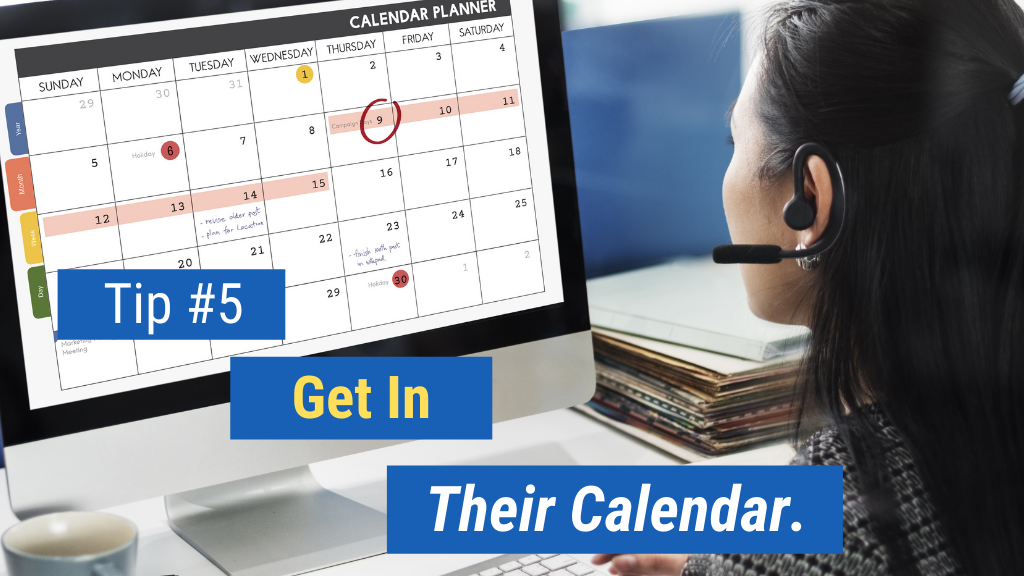
Just calling someone back later—whether it’s them calling you back or you calling them back—is weak sauce. Get in their calendar, and do it at all costs.
If a prospect isn’t willing to schedule a next meeting while they’re still on the phone or in the current meeting with you, it means you’re in big trouble because they don’t actually want to continue the conversation. But it’s better for you to know that now, rather than waste your time following up later.
So, make a big push to get in their calendar and use that as a barometer to understand where they’re at in their interest level of continuing the conversation with you. If they push back really hard on getting a next step in their calendar, you know you’re in trouble.
Tip #6: Call them out.

What happens if a prospect continues to push back and doesn’t want to put a next step in their calendar? Well, now it’s time for you to call them out.
Say something like, “You know what, George? I’ve been doing this for a long time, and what I find is that when people want to call me back later or they’re unwilling to schedule a next step, what they’re really saying is that they just don’t want to continue the conversation. Let me take all the pressure off here. Is that what’s happening?”
This throws the prospect totally off guard. You’ve called them out in a respectful way, and they know that you recognize they weren’t ever intending on actually calling you back.
After this, one of two things can happen.
Either the prospect will say, “You’re right. This conversation doesn’t make sense.” And then you can move on and focus on prospects that are actually a fit for you.
Or, the prospect will say, “No, no, no, I’ve just got a lot going on. I’m interested in talking more.” And then you can say, “Fair enough. If that’s the case, let’s just get something in the calendar so we can avoid all the back-and-forth. Do you have your calendar on you right now?”
This is the time to be firm.
Prospect Says, “I’ll Get Back to You” Tip #7: Be willing to blow up the sale.

To effectively deal with situations where the prospect says, “I’ll get back to you,” you must have the mindset that you have nothing left to lose. Be willing to blow up the sale. Remember, you’ve already effectively lost any sale in which a prospect gives you this objection, since there’s a 1 in 100 chance that they’ll actually get back to you.
Don’t just settle for keeping a weak opportunity like this in your pipeline and hoping for the best.
Always remember that by being firm, calling the prospect out, and pushing back against their objection, you’re giving yourself a far better chance at actually keeping the sale alive than if you simply roll over and go along with what they say.

Use firm language and say things like, “You know what, I really appreciate your saying that. It sounds like you’re really busy, and I’ve got a lot going on as well. But what I find is that if we don’t schedule a next step, things tend to fall apart. Do you have your calendar on you right now?”
Do whatever you can to keep the sale moving forward, including being willing to blow it up. Don’t get aggressive, don’t get angry, but always hold your ground.
So, there you have it. Now you know exactly what to do when a prospect says, “I’ll get back to you.” Which of these tips did you find most useful for your own selling strategy? Be sure to share your thoughts in the comments section to join the conversation.

Enjoyed this article? Please share away!

Get instant access to our free sales training:
Why Prospects Push Back on Price, Give 'Think-It-Overs,' and Ghost in Sales Until They Meet a Sales Superstar Who Is Following These 7 Simple Keys

About the Author Marc Wayshak
Marc is is the best-selling author of three books on sales and leadership, including the highly acclaimed titles Game Plan Selling, The High-Velocity Sales Organization and his forthcoming book, Sales Conversations, Mastered.
Marc is a contributor to Inc, HubSpot, Fast Company, Entrepreneur Magazine, and Huffington Post Business. He also hosts a popular YouTube channel on sales strategy with over 103,000 subscribers.
Marc helps thousands of people his data-driven, science-based approach to selling that utilizes all the best tools available to sales organizations today.

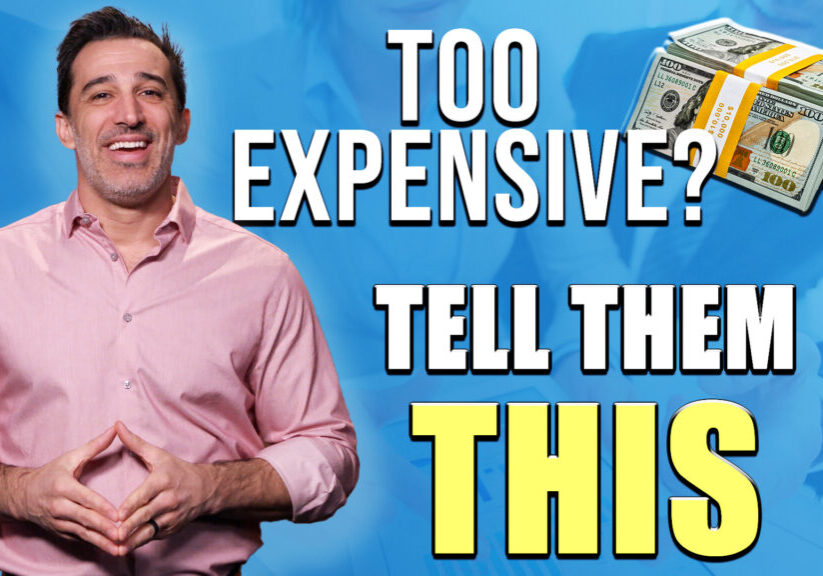
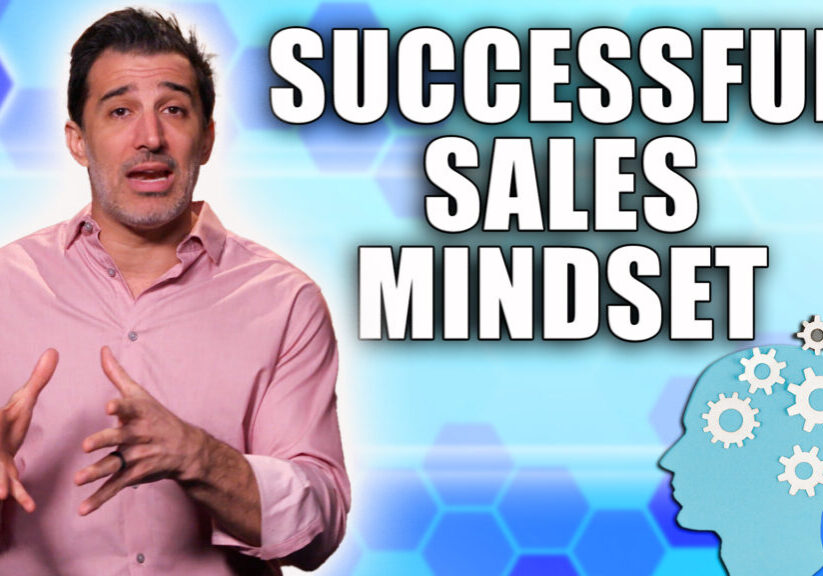
![How-to Sell to Power [C-Suite Sales Must-Knows!] How to Sell to Power [C-Suite Sales Must-Knows!]](https://salesinsightslab.com/wp-content/uploads/bb-plugin/cache/How-to-Sell-to-Power-C-Suite-Sales-Must-Knows-1024x576-landscape-7a52c541b28a7b772ad9e1010d8240be-.jpg)

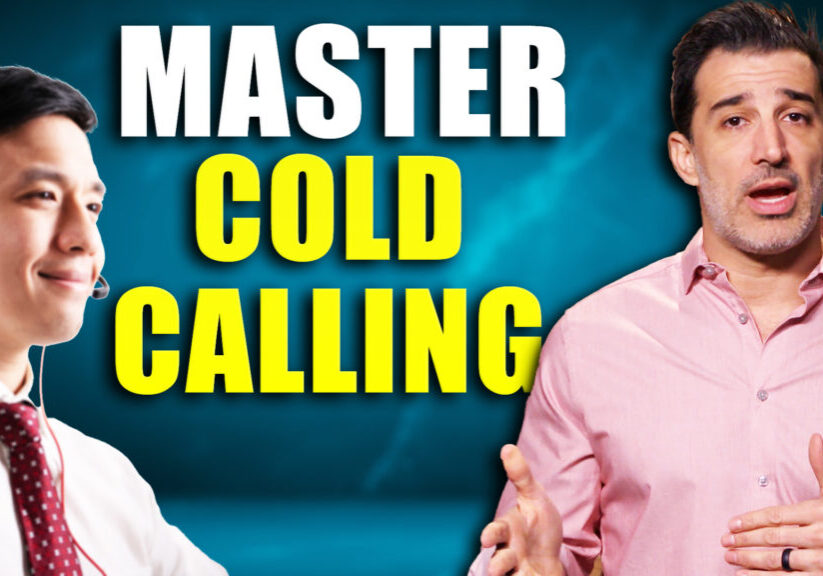
![The Absolute Best Way to Start a Sales Conversation [WITH ANY PROSPECT] The Absolute Best Way to Start a Sales Conversation [WITH ANY PROSPECT]](https://salesinsightslab.com/wp-content/uploads/bb-plugin/cache/The-Absolute-Best-Way-to-Start-a-Sales-Conversation-WITH-ANY-PROSPECT-1024x576-landscape-be9d9379ab94d9f71b5bfeed42246a84-.jpg)